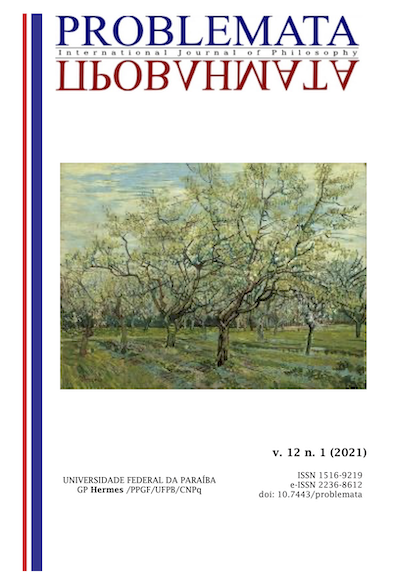STRAUSS AND THE MORAL ANTITHESIS ARGUMENT AGAINST SCIENTISM IN HOBBES' PHILOSOPHY
DOI:
https://doi.org/10.7443/problemata.v12i1.56665Keywords:
Hobbes, Vanity, Civil philosophy, Mechanism, FearAbstract
The aim of this article is to provide a critique of Strauss' claims to determine a moral foundation for Hobbes' civil philosophy. It is therefore a question of discussing the determinations of man's behavior derived from a natural tendency imposed upon him. In this way, the viability of the link between natural philosophy and civil philosophy is exposed in order to determine Hobbes' commitment to the terms of the mechanism of his time. Strauss' argument that the principle of self-preservation is based on a moral antithesis between vanity and the fundamentally just fear of violent death is thus made impossible.
Downloads
References
BALDIN, G. Hobbes e Galileo: metodo, materia e scienza del moto. Firenze: Leo S. Olschki Editore, 2017.
BATES, S. The motivation to be just. Ethics, v. 85, n. 1, p. 1-17, 1974.
BERNS, W. Judicial review and the rights and laws of nature. The Supreme CourtReview, v. 1982, p. 49-83, 1982.
BLITS, J. H. Hobbesian fear. Political Theory, v. 17, n. 3, p. 417-431, 1989.
BRANDT, F. Thomas Hobbes’ mechanical conception of nature. London: Hachette, 1928.
FRATESCHI, Y. A física da política: Hobbes contra Aristóteles. Campinas: Editora da Unicamp, 2008.
GREENLEAF, W. H. Hobbes: o problema da interpretação. In: QUIRINO, C. G.; SOUZA, M. T. S. (org.). O pensamento político clássico. São Paulo: T. A. Queiroz, 1980.
HOBBES, T. De corpore. In: The English works of Thomas Hobbes of Malmensbury. Now first collected and edited by Sir Willian Molesworth. London (1839-1845). Reprint Aelen: Scientia, 1966.
_______________. Leviathan, or the matter, forme and power of a Commonwealth ecclesiasticall and civil. Ed. C. B. Macpherson. Harmondsworth: Penguin Books, 1968.
_______________. Do cidadão. Elementos filosóficos a respeito do cidadão. Tradução de Renato Janine Ribeiro. São Paulo: Martins Fontes, 2002a.
_______________. Elementos da lei natural e política. Tradução de Fernando Dias Andrade. São Paulo: Ícone, 2002b.
KAVKA, G. S. Hobbes’s war of all against all. Ethics, v. 93, n. 2, p. 291-310, 1983.
KIDDER, J. Hobbes’s “just man”. Reason Papers, n. 8, p. 1-15, Summer 1982.
LEIVAS, C. A paixão política do medo na concepção de Hobbes. Dissertatio, v. 33, p. 341-353, Inverno 2011.
PACCHI, A. Hobbes and the passions. Topoi, v. 6, n. 2, p. 111-9, 1987.
POGREBINSCHI, T. O problema da obediência em Thomas Hobbes. Bauru: EDUSC, 2003.
SKINNER, Q. Razão e retórica na filosofia de Hobbes. São Paulo: UNESP, 1999.
SORELL, T. Hobbes’s scheme of the sciences. In: SORELL, Tom (ed.). The Cambridge Companion to Hobbes. Cambridge: University Press, 1996. p. 45-61.
SPRAGENS, T. A. The politics of motion: the world of Thomas Hobbes. Lexington: University Press of Kentucky, 1973.
STAUFFER, D. Strauss’s discussion of Hobbes in “What is political philosophy?”. Perspectives on Political Science, v. 39, n. 2, p. 87-91, 2010.
STRAUSS, L. A filosofia política de Hobbes: suas bases e sua gênese. São Paulo: É realizações, 2016.
TOTO, F. Individuo, potere e relazione in Thomas Hobbes. La Società Degli Individui, v. 19, n. 55, p. 143-158, 2016.
Downloads
Published
Issue
Section
License
Copyright (c) 2021 Mattos Mattos da Silva

This work is licensed under a Creative Commons Attribution 4.0 International License.
Authors who publish with this journal agree to the following terms:
- Authors retain copyright and grant the journal right of first publication with the work simultaneously licensed under a Creative Commons Attribution License that allows others to share the work with an acknowledgement of the work's authorship and initial publication in this journal.
- Authors are able to enter into separate, additional contractual arrangements for the non-exclusive distribution of the journal's published version of the work (e.g., post it to an institutional repository or publish it in a book), with an acknowledgement of its initial publication in this journal.
-
- Authors are permitted and encouraged to post their work online (e.g., in institutional repositories or on their website) prior to and during the submission process, as it can lead to productive exchanges, as well as earlier and greater citation of published work (See The Effect of Open Access).





